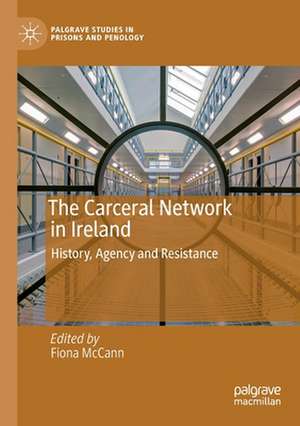The Carceral Network in Ireland: History, Agency and Resistance: Palgrave Studies in Prisons and Penology
Editat de Fiona McCannen Limba Engleză Paperback – 27 iun 2021
| Toate formatele și edițiile | Preț | Express |
|---|---|---|
| Paperback (1) | 638.24 lei 6-8 săpt. | |
| Springer International Publishing – 27 iun 2021 | 638.24 lei 6-8 săpt. | |
| Hardback (1) | 644.95 lei 6-8 săpt. | |
| Springer International Publishing – 27 iun 2020 | 644.95 lei 6-8 săpt. |
Din seria Palgrave Studies in Prisons and Penology
- 8%
 Preț: 489.70 lei
Preț: 489.70 lei - 20%
 Preț: 690.78 lei
Preț: 690.78 lei - 20%
 Preț: 1129.45 lei
Preț: 1129.45 lei -
 Preț: 352.56 lei
Preț: 352.56 lei - 18%
 Preț: 727.97 lei
Preț: 727.97 lei - 18%
 Preț: 788.90 lei
Preț: 788.90 lei -
 Preț: 394.51 lei
Preț: 394.51 lei -
 Preț: 331.94 lei
Preț: 331.94 lei - 18%
 Preț: 950.21 lei
Preț: 950.21 lei - 18%
 Preț: 2131.32 lei
Preț: 2131.32 lei - 15%
 Preț: 709.91 lei
Preț: 709.91 lei -
 Preț: 390.63 lei
Preț: 390.63 lei - 15%
 Preț: 585.08 lei
Preț: 585.08 lei - 18%
 Preț: 728.60 lei
Preț: 728.60 lei - 18%
 Preț: 994.72 lei
Preț: 994.72 lei - 15%
 Preț: 645.47 lei
Preț: 645.47 lei -
 Preț: 390.08 lei
Preț: 390.08 lei - 15%
 Preț: 644.95 lei
Preț: 644.95 lei - 15%
 Preț: 643.99 lei
Preț: 643.99 lei - 15%
 Preț: 647.92 lei
Preț: 647.92 lei - 18%
 Preț: 893.40 lei
Preț: 893.40 lei - 15%
 Preț: 639.25 lei
Preț: 639.25 lei - 15%
 Preț: 696.50 lei
Preț: 696.50 lei - 18%
 Preț: 1113.58 lei
Preț: 1113.58 lei - 18%
 Preț: 782.42 lei
Preț: 782.42 lei - 15%
 Preț: 652.31 lei
Preț: 652.31 lei - 18%
 Preț: 1397.68 lei
Preț: 1397.68 lei - 18%
 Preț: 730.97 lei
Preț: 730.97 lei -
 Preț: 383.12 lei
Preț: 383.12 lei - 15%
 Preț: 644.95 lei
Preț: 644.95 lei - 15%
 Preț: 699.77 lei
Preț: 699.77 lei - 18%
 Preț: 731.73 lei
Preț: 731.73 lei - 18%
 Preț: 897.33 lei
Preț: 897.33 lei - 15%
 Preț: 644.95 lei
Preț: 644.95 lei - 15%
 Preț: 647.40 lei
Preț: 647.40 lei - 15%
 Preț: 642.68 lei
Preț: 642.68 lei
Preț: 638.24 lei
Preț vechi: 750.88 lei
-15% Nou
Puncte Express: 957
Preț estimativ în valută:
122.13€ • 127.94$ • 101.22£
122.13€ • 127.94$ • 101.22£
Carte tipărită la comandă
Livrare economică 08-22 aprilie
Preluare comenzi: 021 569.72.76
Specificații
ISBN-13: 9783030421861
ISBN-10: 3030421864
Pagini: 285
Ilustrații: XIV, 285 p. 9 illus.
Dimensiuni: 148 x 210 mm
Greutate: 0.36 kg
Ediția:1st ed. 2020
Editura: Springer International Publishing
Colecția Palgrave Macmillan
Seria Palgrave Studies in Prisons and Penology
Locul publicării:Cham, Switzerland
ISBN-10: 3030421864
Pagini: 285
Ilustrații: XIV, 285 p. 9 illus.
Dimensiuni: 148 x 210 mm
Greutate: 0.36 kg
Ediția:1st ed. 2020
Editura: Springer International Publishing
Colecția Palgrave Macmillan
Seria Palgrave Studies in Prisons and Penology
Locul publicării:Cham, Switzerland
Cuprins
1 ‘Introduction’, Fiona Mccann.- 2. ‘The Dublin Intermediate Prison System’, Emilie Berthillot.- 3. ‘Shifting Carceral Formations: A Genealogy Of Penal (Re)Construction In The North Of Ireland’, Ruari-Santiago Mcbride.- 4. ‘Rehabilitating The Prison: The Evolution Of Strategies For Dealing With Northern Ireland’s Carceral Heritages’, Chris Hamill.- 5. ‘The Prisoner’s Rights Organisation And Penal Reform In The Republic Of Ireland’, Cormac Behan.- 6. “A Virtually Self-Contained Community”: Unorthodox Containment And Prisoner Autonomy In The Maze/Long Kesh Compounds’, Erin Hinson.- 7. ‘Gusty Spence: Agent Of Conflict, Creativity, And Change’, Connal Parr.- 8. ‘Mairéad Farrell In The Armagh Gaol’, Katherine Side.- 9. ‘Stories From The Cells: The Role Of The Maze And Long Kesh Prison In Peace Time Northern Ireland’, Kate Keane.- 10. ‘Acts Of Survival And Resistance In Industrial And Reformatory Schools In Ireland In The 20th Century’, Sinead Pembroke.- 11. ‘The Room Where Nothing MakesSense: Historiophobic Space And The Aesthetics Of Child Maltreatment’, Mathew Staunton And Deirdre Forde.- 12. “Incarceration, Disavowal, And Ireland’s Prison Industrial Complex”, Ronit Lentin.
Notă biografică
Fiona McCann is Professor of Postcolonial Literature at the Université de Lille, France. She has published widely on contemporary Irish, South African, and Zimbabwean literature and she has a particular interest in writing by political prisoners in the English-speaking postcolonial world.
Textul de pe ultima copertă
This book examines the forms and practices of Irish confinement from the 19th century to present-day to explore the social and political failings of 20th and 21st century postcolonial Ireland. Building on an interdisciplinary conference held in the Crumlin Road Gaol, Belfast, the methodological approaches adopted across this book range from the historical and archival to the sociological, political, and literary. This edited collection touches on topics such as industrial schools, Magdalen laundries, struggles and resistance in prisons both North and South, Direct Provision, and the ways in which prison experiences have been represented in literature, cinema, and the arts. It sketches out an uncomfortable picture of the techniques for policing bodies deployed in Ireland for over a century. This innovative study seeks to establish a link between Ireland’s inhumane treatment of women and children, of prisoners, and of asylum seekers today, and to expose and pinpoint modes of resistance to these situations.
Caracteristici
Examines various forms of incarceration in Ireland from a unique, holistic perspective Draws on mixed methods like semi-structured interviews, archival work, documentary analysis, and photographic analysis Touches on timely topics like Direct Provision — a system of asylum seeker accommodation
